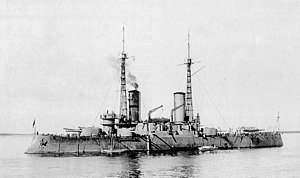Soviet battleship Respublika

Imperator Pavel I in 1912
|
|
| History | |
|---|---|
|
|
|
| Name: | Imperator Pavel I |
| Namesake: | Czar Paul I of Russia |
| Builder: | Baltic Shipyard, Saint Petersburg, Russia |
| Laid down: | 27 October 1905 |
| Launched: | 7 September 1907 |
| In service: | 10 March 1911 |
| Out of service: | September 1918 |
| Renamed: | Respublika (Republic), 1917 |
| Struck: | 21 November 1925 |
| Fate: | Scrapped after 22 November 1923 |
| General characteristics as built | |
| Class and type: | Andrei Pervozvanny-class predreadnought battleship |
| Displacement: |
|
| Length: | 460 ft 0 in (140.2 m) |
| Beam: | 80 ft 0 in (24.38 m) |
| Draught: | 27 ft 0 in (8.23 m) at standard displacement |
| Installed power: | 17,600 ihp (13,100 kW) |
| Propulsion: |
|
| Speed: | 18.5 knots (34.3 km/h; 21.3 mph) |
| Range: | 2,100 nmi (3,900 km; 2,400 mi) at 12 knots (22 km/h; 14 mph) |
| Complement: | 956 |
| Armament: |
|
| Armor: |
|
Imperator Pavel I (Russian: Император Павел I - Czar Paul I) was an Andrei Pervozvanny-class predreadnought battleship built for the Imperial Russian Navy in the first decade of the 20th century. The ship's construction was seriously extended by design changes as a result of the Russo-Japanese War and labor unrest after the 1905 Revolution and she took nearly six years to build. Imperator Pavel I was not very active during World War I and her bored sailors were the first to mutiny in early 1917. The ship was laid up in 1918 and she was scrapped in 1923.
Imperator Pavel I was 454 feet (138.4 m) long at the waterline and 460 feet (140.2 m) long overall. She had a beam of 80 feet (24.4 m) and a draft of 27 feet (8.2 m). She displaced 18,902 long tons (19,205 t) at deep load. Her hull was subdivided by 17 transverse watertight bulkheads and the engine rooms were divided by a centerline longitudinal bulkhead. She had a double bottom and a metacentric height of 4 feet (1.2 m).
Imperator Pavel I had two 4-cylinder vertical triple-expansion steam engines with a total designed output of 17,600 indicated horsepower (13,100 kW). Twenty-five Belleville boilers provided steam to the engines at a working pressure of 285 pounds per square inch (1,970 kPa; 20.0 kgf/cm2). On sea trials, the engines produced 18,596 ihp (13,867 kW) and a top speed of 18.5 knots (34.3 km/h; 21.3 mph). She carried a normal load of 800 long tons (810 t) of coal that provided a range of 1,300 nautical miles (2,400 km; 1,500 mi) at a speed of 12 knots (22 km/h; 14 mph) and a maximum load of 1,500 long tons (1,500 t) that gave 2,400 nautical miles (4,400 km; 2,800 mi) at the same speed.
...
Wikipedia
